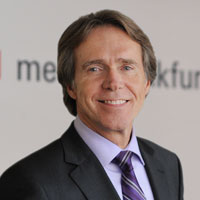We ask four exhibition organisers and tech suppliers: Is a show’s digital element a deterrent from the main event?
Peder Berg, managing director, Event Advantage Solutions

"Not long ago, I read a post on LinkedIn that argued that the use of technology, especially mobile technology at events, was a distraction and deterrent from the core objective of getting people together face-to-face. I could not disagree more.
"The author was right to say it’s event organisers’ responsibility to get people meeting face-to-face. However in today’s world of mass media marketing, and an event for every industry, putting tens of thousands of visitors in the same room as hundreds, or thousands, of exhibitors is a futile attempt at marketing.
"It’s essentially blindly casting your hook into the water and hoping that something interesting will bite.
"Technology enables visitors to research and determine the best individuals or companies to meet at an event, to make the best use of time. In addition, third party standard technologies such as LinkedIn and Twitter allow for a dialogue between participants and helps spread the word on a peer-to-peer level, which is incredibly effective.
"A couple of major events that we work on come to mind when thinking about the opportunity of maximizing the possibilities for visitors and exhibitors. The first is the World Travel Market, which takes up almost all of ExCeL in London and Big 5 which takes up all of the DWTC in Dubai. In both cases, these events are must-attend events for anyone who is serious about their industry, travel and construction respectively.
"However, without the use of intelligent technology that allows for match-making, data capture, and event navigation, there would be seas of lost and wandering visitors and increasingly frustrated exhibitors, both groups who would be wasting their time in meetings with people who didn’t fit their objectives.
"As it happens, both organisers for WTM and Big 5 embrace technologies such as meeting planning software, hosted buyer technologies, visitor apps, and advanced lead capture solutions to ensure that the right people are meeting the right people at their events and that they are providing the highest level of service to the industry that supports them.
"Technology at events isn’t about thousands of visitors walking around with their eyes glued to their phones, its about cutting out the static, streamlining relationships, spreading the word, and getting buyers meeting sellers in an efficient and effective manner."
Jo-Anne Kelleway, founder and chief executive, Info Salons Group
 Jo-Anne Kelleway,
Jo-Anne Kelleway,"Digital is disrupting the tradeshow and exhibition industry as we know it. But technology isn’t a deterrent from the main event, it’s transforming it from a stodgy old trading floor to vibrant “event spectaculars”.
"The Global Center for Digital Business Transformation states: “Disrupting yourself” does not mean discarding what has made you successful. Rather, it involves challenging the assumptions that have underpinned that success, and stress-testing the ways in which you deliver value to customers - this is digital business transformation.
"That is exactly what digital is helping our industry to do. The way our attendees experience our events has changed forever. Booth walk-bys are being replaced with pre-scheduled meetings, and random product discoveries are now pre-planned by matching exact interest requirements.
"Networking at events has become easier by using digital tools that introduce you to potential business partners and “break the ice” before you meet face-to-face.
"But the more digital we become, the more we are craving these face-to-face experiences. You can’t satisfy all of the five basic human senses online – but on the expo floor you can see, hear, touch, smell and taste new products and services all wrapped up in an impressive experience.
"According to a recent report from Software Advice, B2B marketing professionals in the USA who have experience with demand generation channels, tactics, and metrics, stated that overall, tradeshows were the channel that generates both the most and the best leads.
"I am very encouraged that in this digital era the exhibition industry will be acknowledged for what it really represents: the development of economies, the growth of businesses and the platform to deliver true engagement of our basic human need, that being, to reach out and touch what and who we are interested in."
Christopher Newton, director, Montgomery

"Can you remember what it was like pre-digital? All those brochures, out of date the moment they had been produced, often blighted by a silly typo and regularly returned by the postman marked ‘Gone Away’.
"The digital world has transformed the way we communicate with just about everyone. It has enabled us to access tens of thousands of prospective clients at the click of a button. It has changed the way we research, question, inform, sell or promote enabling us to develop a much closer working relationship with our target audiences of potential exhibitors or visitors.
"Merging the immediacy of digital with the slow build-up for an annual or biennial event is a skill that event organisers have quickly learnt. The ability to keep in constant touch with our clients is brilliant, but the skill is in using the technology the right way; to entertain, educate and entice, not to bore or annoy.
"The very fast developing world of digital communications should keep every organiser awake at night as they plan their ongoing campaigns. Different market sectors respond to different social media. What works for architecture and design might not work for food, drink and hospitality. Whilst Twitter may be the best route to market for some clients, Facebook might be better for others.
"Digital will continue to develop at speed; it will offer organisers yet more exciting opportunities to make their events topical, exciting and creative. It gives us the chance to communicate regularly and immediately with audiences around the world and to turn annual events into significantly more exciting 365-day events that truly cater to our industries’ needs."
Klaus Reinke, chief of strategy, Messe Frankfurt Group

"Many people in our industry still discuss traditional shows on the one hand and virtual exhibitions on the other hand. At Messe Frankfurt, we don’t believe in “black vs white” thinking. Neither do our customers.
"They have long decided what it is that they want: physical meetings, where they can meet face-to-face and forge successful business relationships during a precious few days in the year. And to deliver on this promise, we increasingly use digital tools and products. As such, every good trade show has to embrace digital products and services.
"As an example, at Messe Frankfurt we provide apps to our shows to support our customers. And to make sure that our attendees can use these apps properly, we provide free Wifi. And again, to make sure that their smartphone batteries last a full busy day on the show floor, we provide charging stations in rest areas.
"Through these three little things we make sure that our customers can benefit from digital technology during their trade show visit, and beyond, as the contacts they made and the documents they stored in the app are available for them all year round through our online services at the click of a button across platforms.
"From electricity to international travel – progress has always allowed us to build and provide better marketplaces for our customers. So does digital hamper the main event? Most certainly not. Instead, it helps us to deliver ever better connections for the markets we serve."






